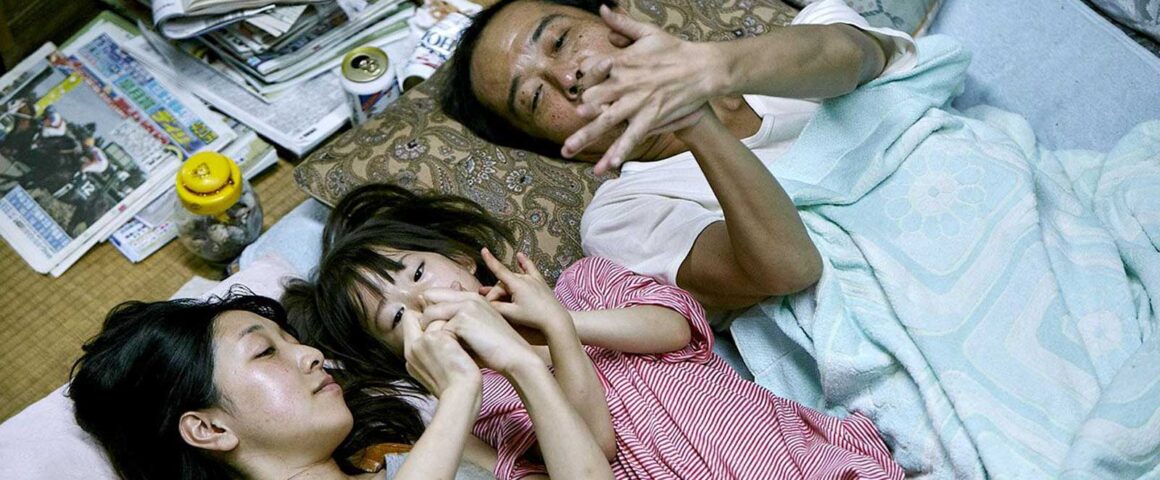The great Japanese director Hiorkazu Koreeda (“The Third Murderer”) continues his exploration of the true meaning of family In Shoplifters (Manbiki kazoku), a quest he began in his award-winning 2013 film, “Like Father, Like Son.” Winner of the Palme d’Or award at the 2018 Cannes Film Festival and the first Japanese film to win the award since Shohei Imamura’s “The Eel” in 1997, the film is focused on marginalized people existing on the fringes of Japanese society who barely eke out a living by engaging in activities that skirt the letter of the law. It is the story of flawed people who have patched together a working “family” of outcasts who believe that the impulse to survive and create a nurturing environment is more important than strict adherence to society’s norms.
The film opens in a supermarket where Osamu Shibata (Lily Franky, “After the Storm”), a middle-aged, part-time construction worker, is seen exchanging strange hand signals with a pre-teenage boy, Shota (Jyo Kairi), who seems to regard what is going on as a family outing. It quickly becomes apparent that this is no ordinary family shopping spree but an exercise in shoplifting, as we watch Shota casually throw items from the shelves into his shopping bag when no one is looking. Justifying their flouting of the law, Osamu says that if the goods are in the store, it means that they do not belong to anyone, and tells Shota that they are stealing the items only as a means of helping the family.
Much later when questioned about stealing by the authorities, sadly he says that shoplifting was the only skill he had to teach the boy. Osamu, as it is gradually revealed, is the head of a household consisting of husband (Franky) and wife Noboyu (Sakura Andô, “Destiny: The Tale of Kamakura”), teenage daughter Aki (Mayu Matsuoka, “Tremble All You Want”), her younger brother Shota (Kairi), and grandma Hatsue (the late Kirin Kiki, “I Wish”), all living in a small, cluttered apartment outside of Tokyo, scattered toys and knick-knacks everywhere, barely providing the family with enough room to eat and sleep.
The family, as it turns out, is one in name only, consisting of those who have been “picked up along the way,” and brought together as a means of mutual support. We discover that it is not only Osamu and Shota that are engaged in dubious activity but the others as well. Noboyu works as an attendant in a laundry and pockets things people leave in their pockets. Aki contributes by working in a porn shop, performing sex acts for men who are hidden from her view, while grandma is a conniver who plays the pachinko slot machines, claims her deceased husband’s pension, and collects money from his son from another marriage.
The family’s lives change drastically when Osamu and Shota find Yuri (Miyu Sasaki), a shivering little girl of four or five alone in the streets, seemingly abandoned. With her protection in mind, Osamu, who renames her Rin, brings the little girl home and discovers bruises on her arms that indicate she has been physically abused. Later, they see a news story on television about a child who is missing and how authorities are conducting an extensive search for her. Justifying their decision to hide the girl from the authorities, Osamu tells the others that it is not kidnapping unless you ask for ransom.
Osamu claims that they fear for her safety if she is returned to an abusive situation, yet he is not above using her as a decoy in markets as he and Shota engage in shoplifting. Through it all, Koreeda does not stand in judgment of his characters but simply observes the trajectory of their life in the tradition of Ozu and Naruse. When he moves into darker territory in the film’s last section, its main focus remains on the humanity of the characters. When Nobuyo disposes of an item that is a painful reminder for Yuri about the family that abused her, she gives her a big hug, explaining that when people love each other, they give them hugs and do not hit them. In an exquisite moment, Yuri places her hand on Nobuyo’s face who lets it remain there for a few minutes.
While Shoplifters contains elements that are painful to watch, what we take with us is Koreeda’s empathy displayed in the beauty of small moments: The joy of trips to the beach, the sexual intimacy between partners that has been long repressed, and the expression on the faces of young children aware, perhaps for the first time, that they are loved.




'Movie Review: Shoplifters (2018)' has no comments